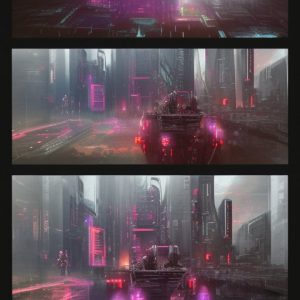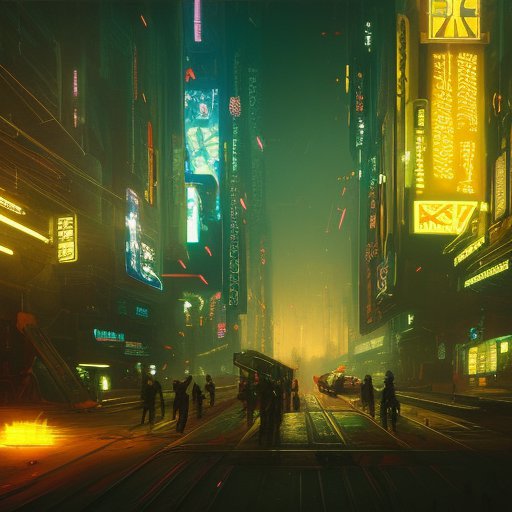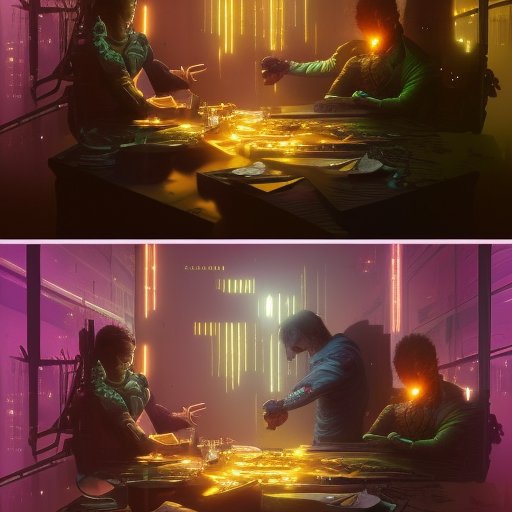
Exploring the past, present, and future of cyberpunk role playing, this article delves into the genre’s definition, origins, themes, and technology. It examines the games that have popularised the genre, from Dune to A Fire Upon the Deep, and considers what the future may hold. Uncovering the impact of cyberpunk role playing on the gaming world, this article is a must-read for any sci-fi fan.
I. Introduction
Welcome to the world of cyberpunk role playing! This is a realm of incredibly advanced technology and complex societies, where the past, present, and future all collide. For the past three decades, the genre has been growing in popularity, offering a unique blend of science fiction and fantasy for gamers to explore.
In this article, we will explore the history of cyberpunk role playing games, from their beginnings in the early 80s to their current state. We will examine the defining characteristics of the genre, the themes it focuses on, and some of the most popular titles. We’ll also take a look at the technology involved in these games, and our predictions for the future of cyberpunk role playing. So, let’s jump in!
II. Definition of Cyberpunk
Cyberpunk is a genre of science fiction that typically focuses on a near-future world where technology and human advancement have become intertwined. This combination of technology and humanity is often referred to as “cybernetics”, and it is the primary focus of the genre. Cyberpunk stories often involve high-tech gadgets, artificial intelligence, and superhuman abilities, as well as themes of rebellion and chaos.
The term was coined by author Bruce Bethke in his 1980 short story “Cyberpunk”, and has since been used to describe a variety of science fiction works from films and television shows to books, video games, and role playing games. Cyberpunk role playing games often feature a dystopian, post-apocalyptic setting, where technology has caused major changes in the way society functions. These games typically focus on themes of technology, cybernetics, and a future world where the rules have changed and anything is possible.
III. Origins of Cyberpunk
The origins of cyberpunk can be traced back to the early 1980s, when writers such as William Gibson, Bruce Sterling, and Rudy Rucker began to explore the possibilities of a future where technology and humanity collided. These authors pushed the boundaries of science fiction, creating a unique blend of dystopian and utopian worlds, where the power of technology was both a blessing and a curse.

The genre quickly caught on, inspiring a new wave of authors, artists, and game designers to explore its potential. In 1984, William Gibson and Michael Swanwick released their novel Neuromancer, which is widely considered to be the defining work of the cyberpunk genre. This book, along with novels such as Neal Stephenson’s Snow Crash, helped to cement the genre’s place in popular culture, and inspired many of the role playing games that followed.
In the late 1980s and early 1990s, a number of cyberpunk-themed role playing games were released, including Shadowrun, Cyberpunk 2020, and GURPS Cyberpunk. These games drew heavily on the themes and settings of the genre, and helped to further popularize the cyberpunk aesthetic.
Since then, the cyberpunk genre has continued to evolve, as new authors, artists, and game designers explore its potential. The genre has been adapted to a variety of different settings, from the post-apocalyptic wastelands of Shadowrun to the far future of A Fire Upon the Deep. Cyberpunk has become one of the most influential genres in popular culture, and continues to inspire new generations of gamers and storytellers.
IV. Cyberpunk in Role Playing Games
Cyberpunk role playing games first emerged in the early 1980s, becoming one of the most popular genres of the decade. These games combine elements of science fiction and fantasy, allowing players to explore a dark and dangerous futuristic world. Themes such as artificial intelligence, cybernetic implants, and dystopian societies are often explored in these games.

Players take on the role of a character, often a hacker or a cyborg, and use their skills to navigate the world. As the game progresses, players can customize their characters with special abilities, weapons, and cybernetic enhancements. The ultimate goal is to complete missions, defeat enemies, and discover secrets.
The majority of cyberpunk role playing games are set in a post-apocalyptic world, usually with a dystopian government or corporation in control. This allows players to experience a world that is drastically different than our own. Players must rely on their wits and skills to survive and progress, as the game features a variety of puzzles and challenges.
Cyberpunk role playing games require players to think strategically and use creativity to make decisions. As players progress, they must decide how to use their skills, weapons, and cybernetic enhancements to overcome obstacles and defeat enemies. Players must also form alliances, build relationships, and make tough moral choices.
V. Themes of Cyberpunk
The themes of cyberpunk are varied and complex. It often focuses on the idea of a dystopian future, where oppressive governments or corporations control the lives of citizens. These themes can be seen in the classic cyberpunk movie Blade Runner, where the protagonist is a “blade runner” tasked with hunting down a group of bioengineered humans. Cyberpunk also often involves themes of technology and the evolution of humanity, as well as the effects of technology on the environment.

Other popular themes in cyberpunk include post-humanism and transhumanism, which focus on the idea of humans augmenting themselves with technology or even becoming something entirely different. Cyberpunk also often explores the idea of artificial intelligence and its implications for the future. There is also a strong focus on the idea of a global network, where data and information can be manipulated and shared easily.
Cyberpunk also often deals with the idea of identity, and how people’s identities are shaped by their environment and the technology they use. In this way, cyberpunk is able to explore the idea of a post-human future, in which technology has drastically changed society. It is also a genre that often deals with themes of rebellion and resistance, as the protagonists strive to challenge the status quo and break free from oppressive systems.
VI. Popular Cyberpunk Role Playing Games
Popular cyberpunk role playing games have been around since the early 80s. From the classic tabletop games like Paranoia and Shadowrun, to the newly released video games like Cyberpunk 2077, the genre has been a staple of the gaming world.

The classic tabletop games offer a unique blend of narrative, strategy, and role playing that allow players to create and explore a cyberpunk world. With intricate rules and systems, these games are designed to foster creativity and collaboration among players.
Video games offer a more immersive experience, allowing gamers to explore a richly detailed cyberpunk world. Popular titles such as Deus Ex and System Shock blend intense action with thought-provoking storylines. Players can explore the world and make choices that affect the outcome of the game.
Online RPGs take the genre to the next level. With massive multiplayer worlds, players can join forces to explore a cyberpunk universe, taking on missions and battling foes. Titles such as Cyberpunk Red and Cyberpunk 2077 have taken the genre to a whole new level, allowing players to create their own characters and customize their play style.
No matter which type of game they choose, players are sure to be immersed in a cyberpunk world full of adventure and intrigue. Whether they’re exploring a dystopian cityscape or battling robots in the future, cyberpunk role playing games offer a unique experience that is sure to entertain.
VII. Cyberpunk Technology
The technology of cyberpunk role playing games is a major part of their appeal. From the advanced weaponry to the cybernetics, the genre offers a glimpse into a world of cutting-edge science. In these games, technology has become a huge part of life and is used by both corporations and criminals.

One of the most iconic elements of cyberpunk is the use of cybernetics. These are body modifications that enhance the user’s abilities, such as increased strength, speed, and senses. Cybernetics are often seen as a way to gain an edge in combat, though they can also be used for more mundane tasks like data entry or monitoring.
The weapons of cyberpunk role playing games are often heavily advanced. From laser guns to plasma cannons, the possibilities for futuristic weaponry are almost endless. These weapons often have special effects, such as shocking or setting targets on fire. They are also often integrated with the user’s cybernetics, allowing them to be used with greater precision and accuracy.
The technology of the cyberpunk world often goes beyond weapons and cybernetics. Augmented reality, artificial intelligence, and robotics are all common elements in these games. These technologies often have a major impact on the world, as they can be used for both good and evil purposes.
Finally, hacking is a major part of cyberpunk role playing games. Players can use their knowledge of programming and computers to gain an advantage over their opponents. This often involves breaking into computer systems and manipulating data, as well as using special programs to gain an edge in combat.
Cyberpunk technology is an essential part of the genre, and its impact on the world can be seen in many of the games. From advanced weapons to augmented reality, these elements add to the atmosphere of the games and create a futuristic world that gamers can explore and interact with.
VIII. Future of Cyberpunk Role Playing Games
The future of cyberpunk role playing games looks bright. With the advent of new technologies such as virtual reality, the potential for immersive, multi-dimensional gaming experiences is limitless. Additionally, with the rapid advances in artificial intelligence, the possibilities for smarter and more interactive non-player characters are growing exponentially.

The genre also has a lot of potential in the realm of storytelling. Cyberpunk role playing games can explore themes of morality and humanity in ways that traditional RPGs cannot. In the future, these games could offer players an opportunity to explore their own values and beliefs as they take on the roles of different characters.
Additionally, as the technology continues to improve, cyberpunk role playing games could offer an even more immersive experience. Augmented reality, for example, could allow players to move their in-game characters around real-world environments.
The possibilities for the future of cyberpunk role playing games are virtually limitless. As technology continues to advance, and the genre continues to grow in popularity, the genre will surely continue to offer players new and exciting experiences.






